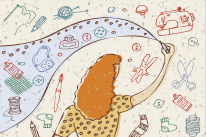
“It’s also helpful to realize that this very body that we have, that’s sitting right here right now…with its aches and its pleasures…is exactly what we need to be fully human, fully awake, fully alive.” ~Pema Chodron
Many people like to think of grief as an emotional experience. It’s something that dominates your internal, emotional space, and that’s it.
But it doesn’t take long when you’re in the thick of grief to experience grief that isn’t emotional at all.
You feel heavy. Like there’s a giant weight on your shoulders.
You feel like your legs are weak and shaking from trying to stand after the ground has been pulled out from underneath you.
It’s hard to breathe because it feels like the wind has been knocked out of you.
You feel heartbroken. Like there is literally a hole punched in your chest. Your grief is as much physical as it is emotional.
Each of the times you experience intense emotional grief you have also been a human being, in your body, experiencing what’s going on.
When I started to recognize my own body as part of my grieving, I discovered my favorite way to ease the pain from grief for myself and for people around me.
You see, when I was fourteen I started high school two weeks after my dad died.
As I walked into that school building, everyone knew what happened, but at the same time I felt like I had no allies. No one that understood. That knew my dad, or that knew where I was coming from.
The first couple months I just tried to get by.
I did the motions.
Didn’t ask too many questions.
Nodded and shook my head at the appropriate times, making sure each day I came back with the worksheets filled out and ready to turn in.
I was like a machine.
My school counselor checked in with me each week to see how things were going. I saw her in homeroom every Tuesday.
“How’s it going, Kirsten?” she’d ask.
“It’s so hard,” I repeated again and again.
So when she sat me down in her office after the first term, she braced herself for the worst. She’d gathered all the paperwork and people she needed to begin a full blown intervention. And then she looked at my grades.
“Kirsten! What are you talking about?”
“What do you mean?”
“You have excellent grades. What do you mean ‘school is hard’?”
“That’s just it. It’s one thing to fill out a worksheet everyday (this is what I now call “showing signs of life”), it’s another thing to actually do this school thing. I barely feel like I get settled in one class before the bell rings for the next one. I can’t switch my mind from thinking about geometry to immediately conjugate Spanish verbs. My world runs in slow motion, and this place doesn’t slow down.”
“What can I do to help you?” she asked.
“I don’t know.”
Because I didn’t know.
That’s totally normal not to know.
Later that week, I found out from my mom that all my teachers had met about how they could help me, and they offered me an extra set of textbooks to keep at home so I didn’t have to carry around heavy books all day.
“Why would I want that?” I told Mom. I didn’t want any special treatment.
“Just try it, Kirsten,” my mom encouraged.
So because she’s my mom, I listened.
And it was the BEST. THING. EVER.
On the physical level, it literally lightened the weight on my shoulders. It reinforced the true reality that just showing up to class was more than enough.
It meant that just being there was all I needed to do, and the rest of the stuff—the logistics—were already taken care of.
So when you know you’re going to have an emotionally intense day, what’s one thing you could do to lighten your load?
Maybe it’s setting a timer when you’re cooking so you don’t have to remember how many minutes the pasta has been on the stove. Lighten your mental load so you have space to be with your thoughts.
Maybe it’s resetting expectations your family has of you, being honest with them about what you are not available to do so you can use that open space for yourself.
Whatever it is, think about the little things that cause you stress and use those as a source of inspiration for what actions will help.
The other key part of the textbooks gesture is that it was a gesture that recreated trust.
You see, in that one small gesture of giving me an extra set of textbooks, my teachers showed me they trusted me.
They trusted me with these expensive things and they trusted that I would take their gift with respect.
All the while, I didn’t know if I could trust myself.
What was even left of me?
It felt like I was all grief and no me.
When someone, a whole group of someones who I respected, said with their action, “We trust you,” it was the first time in a long time I was extended a gentle invitation to trust my community again.
I didn’t have to feel up for every social event or trust the whole world yet, but I could trust my teachers.
Suddenly, I had a whole group of undercover allies.
None of the other students knew I had been given “special treatment.” And each day I walked from class to class to class, I knew there was at least one person in the room I could trust.
That one action was more powerful than any amount of words my teachers said to me over the entire year.
Here’s what I want you to take away, even if you can’t resolve the pain from a feeling: Try to alleviate some of the physical burden. By doing so, you are creating space for you to heal that would never have occurred if you focus only on words, wondering “What do I say? How can I talk about grief?”
Pay attention, listen to your body.
Even if you can’t take away the emotions right now, what can you do to relieve the physical burden?
How can you relax the gripping around your heart?
What can you do to release the physical tension in your muscles?
It might not take away everything, but just a little something can make a world of difference.
About Kirsten Schowalter
Kirsten Schowalter is the founder of Aging Courageously and the author of In My Own Skin.













 Though I run this site, it is not mine. It's ours. It's not about me. It's about us. Your stories and your wisdom are just as meaningful as mine.
Though I run this site, it is not mine. It's ours. It's not about me. It's about us. Your stories and your wisdom are just as meaningful as mine. 